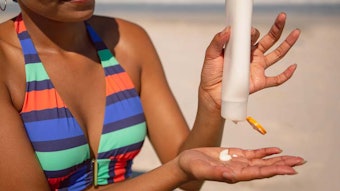A report released recently by the Environmental Working Group (EWG) has targeted sunscreens, which John Bailey, chief scientist at the Personal Care Products Council, stated in a June 30, 2008, release is an "unjustified attempt to discredit an extensive, long-standing body of scientific data." According to the council, sunscreen products have been thoroughly studied and tested, and used safely for more than 30 years. The council has released a statement in response to the report by the EWG specifically claiming that oxybenzone is potentially harmful.
Being over-the-counter (OTC) drugs, sunscreens are subject to rigorous scientific and regulatory oversight by the US Food and Drug Administration (FDA) and in addition, the safety and effectiveness of sunscreens is ensured by the FDA’s drug advisory panel—a committee of independent scientific and medical experts that advises the agency, the dermatological community, and the companies that invest significant time and resources to provide consumers with safe and effective products. The council questions the EWG’s methodology and data sources.
The EWG report on sunscreen, and specifically oxybenzone, is based on studies by the Centers for Disease Control (CDC) that link the sunscreen ingredient to allergies, hormone disruption and cell damage; and a report by the Mt. Sinai School of Medicine that linked the ingredient to low birth weight in baby girls whose mothers are exposed during pregnancy.
Oxybenzone was last reviewed for safety in the 1970s, according to the EWG. They group's report states, "A recent review by the European Union found insufficient data to determine whether oxybenzone in sunscreen is safe for consumers. The group also found that 84% of 910 sunscreen products offer inadequate protection from the sun, or contain ingredients like oxybenzone, with safety concerns.
According to the council, the FDA can and has pulled any sunscreen off the shelves containing questionable actives. The council also points out that any suggestion that the FDA has purposely delayed finalizing the sunscreen monograph is incorrect.
Addressing the safety of oxybenzone, the council stated that the ingredient is approved by the FDA, the European Union and Canada as a safe and effective sunscreen ingredient. It has also been reviewed by the Cosmetic Ingredient Review (CIR) Expert Panel and determined to be safe for uses other than as a UV filter. To view the reports, visit www.personalcarecouncil.org or www.ewg.org.










